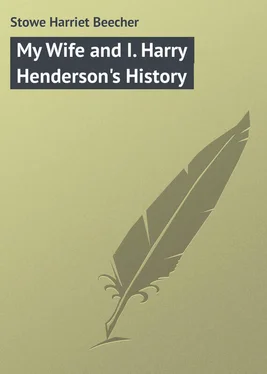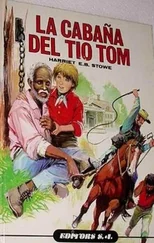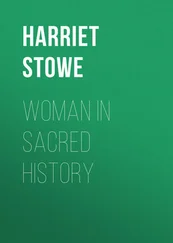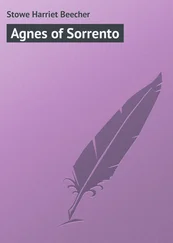Harriet Stowe - My Wife and I. Harry Henderson's History
Здесь есть возможность читать онлайн «Harriet Stowe - My Wife and I. Harry Henderson's History» — ознакомительный отрывок электронной книги совершенно бесплатно, а после прочтения отрывка купить полную версию. В некоторых случаях можно слушать аудио, скачать через торрент в формате fb2 и присутствует краткое содержание. ISBN: , Издательство: Иностранный паблик, Жанр: foreign_prose, foreign_language, на английском языке. Описание произведения, (предисловие) а так же отзывы посетителей доступны на портале библиотеки ЛибКат.
- Название:My Wife and I. Harry Henderson's History
- Автор:
- Издательство:Иностранный паблик
- Жанр:
- Год:неизвестен
- ISBN:http://www.gutenberg.org/ebooks/47874
- Рейтинг книги:5 / 5. Голосов: 1
-
Избранное:Добавить в избранное
- Отзывы:
-
Ваша оценка:
- 100
- 1
- 2
- 3
- 4
- 5
My Wife and I. Harry Henderson's History: краткое содержание, описание и аннотация
Предлагаем к чтению аннотацию, описание, краткое содержание или предисловие (зависит от того, что написал сам автор книги «My Wife and I. Harry Henderson's History»). Если вы не нашли необходимую информацию о книге — напишите в комментариях, мы постараемся отыскать её.
My Wife and I. Harry Henderson's History — читать онлайн ознакомительный отрывок
Ниже представлен текст книги, разбитый по страницам. Система сохранения места последней прочитанной страницы, позволяет с удобством читать онлайн бесплатно книгу «My Wife and I. Harry Henderson's History», без необходимости каждый раз заново искать на чём Вы остановились. Поставьте закладку, и сможете в любой момент перейти на страницу, на которой закончили чтение.
Интервал:
Закладка:
I have dim, hot, hazy recollections of burning, thirsty, head-achey days, when I longed for cold water, and could not get a drop, according to the good old rules of medical practice in those times. I dimly observed different people sitting up with me every night, and putting different medicines in my unresisting mouth; and day crept slowly after day, and I lay idly watching the rays of sunlight and flutter of leaves on the opposite wall.
One afternoon, I remember, as I lay thus listless, I heard the village bell strike slowly – six times. The sound wavered and trembled with long and solemn intervals of shivering vibration between. It was the numbering of my Daisy's little years on earth, – the announcement that she had gone to the land where time is no more measured by day and night, for there shall be no night there.
When I was well again I remember my mother told me that my little Daisy was in heaven, and I heard it with a dull, cold chill about my heart, and wondered that I could not cry.
I look back now into my little heart as it was then, and remember the paroxysms of silent pain I used to have at times, deep within, while yet I seemed to be like any other boy.
I heard my sisters one day discussing whether I cared much for Daisy's death.
"He don't seem to, much," said one.
"Oh, children are little animals, they forget what's out of sight," said another.
But I did not forget, – I could not bear to go to the meadow where we gathered strawberries, – to the chestnut trees where we had gathered nuts, – and oftentimes, suddenly, in work or play, that smothering sense of a past, forever gone, came over me like a physical sickness.
When children grow up among older people and are pushed and jostled, and set aside in the more engrossing interests of their elders, there is an almost incredible amount of timidity and dumbness of nature, with regard to the expression of inward feeling, – and yet, often at this time the instinctive sense of pleasure and pain is fearfully acute. But the child has imperfectly learned language. His stock of words, as yet, consists only in names and attributes of outward and physical objects, and he has no phraseology with which to embody a mere emotional experience.
What I felt when I thought of my little playfellow, was a dizzying, choking rush of bitter pain and anguish. Children can feel this acutely as men and women, – but even in mature life this experience has no gift of expression.
My mother alone, with the divining power of mothers, kept an eye on me. "Who knows," she said to my father, "but this death may be a heavenly call to him."
She sat down gently by my bed one night and talked with me of heaven, and the brightness and beauty there, and told me that little Susie was now a fair white angel.
I remember shaking with a tempest of sobs.
"But I want her here ," I said. "I want to see her."
My mother went over all the explanations in the premises, – all that can ever be said in such cases, but I only sobbed the more.
" I can't see her! Oh mother, mother!"
That night I sobbed myself to sleep and dreamed a blessed dream.
It seemed to me that I was again in our meadow, and that it was fairer than ever before; the sun shone gaily, the sky was blue, and our great, golden lily stocks seemed mysteriously bright and fair, but I was wandering lonesome and solitary. Then suddenly my little Daisy came running to meet me in her pink dress and white apron, with her golden curls hanging down her neck. "Oh Daisy, Daisy!" said I running up to her. "Are you alive? – they told me that you were dead."
"No, Hazzy, dear, I am not dead, – never you believe that," she said, and I felt the clasp of her soft little arms round my neck. "Didn't I tell you we'd see each other again?"
"But they told me you were dead," I said in wonder – and I thought I held her off and looked at her, – she laughed gently at me as she often used to, but her lovely eyes had a mysterious power that seemed to thrill all through me.
"I am not dead, dear Hazzy," she said. "We never die were I am – I shall love you always," and with that my dream wavered and grew misty as when clear water breaks an image into a thousand glassy rings and fragments.
I thought I heard lovely music, and felt soft, clasping arms, and I awoke with a sense of being loved and pitied, and comforted.
I cannot describe the vivid, penetrating sense of reality which this dream left behind it. It seemed to warm my whole life, and to give back to my poor little heart something that had been rudely torn away from it. Perhaps there is no reader that has not had experiences of the wonderful power which a dream often exercises over the waking hours for weeks after – and it will not appear incredible that after that, instead of shunning the meadow where we used to play, it was my delight to wander there alone, to gather the strawberries – tend the birds' nests, and lie down on my back in the grass and look up into the blue sky through an overarching roof of daisies, with a strange sort of feeling of society, as if my little Daisy were with me.
And is it not perhaps so? Right along side of this troublous life, that is seen and temporal, may lie the green pastures and the still waters of the unseen and eternal, and they who know us better than we know them, can at any time step across that little rill that we call Death, to minister to our comfort.
For what are these child-angels made, that are sent down to this world to bring so much love and rapture, and go from us in such bitterness and mourning? If we believe in Almighty Love we must believe that they have a merciful and tender mission to our wayward souls. The love wherewith we love them is something the most utterly pure and unworldly of which human experience is capable, and we must hope that every one who goes from us to the world of light, goes holding an invisible chain of love by which to draw us there.
Sometimes I think I would never have had my little Daisy grow older on our earth. The little child dies in growing into womanhood, and often the woman is far less lovely than the little child. It seems to me that lovely and loving childhood, with its truthfulness, its frank sincerity, its pure, simple love, is so sweet and holy an estate that it would be a beautiful thing in heaven to have a band of heavenly children, guileless, gay and forever joyous – tender Spring blossoms of the Kingdom of Light. Was it of such whom he had left in his heavenly home our Saviour was thinking, when he took little children up in his arms and blessed them, and said, "Of such is the Kingdom of Heaven?"
CHAPTER IV.
MY SHADOW-WIFE
My Shadow Wife! Is there then substance in shadow? Yea, there may be. A shadow – a spiritual presence – may go with us where mortal footsteps cannot go; walk by our side amid the roar of the city: talk with us amid the sharp clatter of voices; come to us through closed doors, as we sit alone over our evening fire; counsel, bless, inspire us; and though the figure cannot be clasped in mortal arms – though the face be veiled – yet this wife of the future may have a power to bless, to guide, to sustain and console. Such was the dream-wife of my youth.
Whence did she come? She rose like a white, pure mist from that little grave. She formed herself like a cloud-maiden from the rain and dew of those first tears.
When we look at the apparent recklessness with which great sorrows seem to be distributed among the children of the earth, there is no way to keep our faith in a Fatherly love, except to recognize how invariably the sorrows that spring from love are a means of enlarging and dignifying a human being. Nothing great or good comes without birth-pangs, and in just the proportion that natures grow more noble, their capacities of suffering increase.
Читать дальшеИнтервал:
Закладка:
Похожие книги на «My Wife and I. Harry Henderson's History»
Представляем Вашему вниманию похожие книги на «My Wife and I. Harry Henderson's History» списком для выбора. Мы отобрали схожую по названию и смыслу литературу в надежде предоставить читателям больше вариантов отыскать новые, интересные, ещё непрочитанные произведения.
Обсуждение, отзывы о книге «My Wife and I. Harry Henderson's History» и просто собственные мнения читателей. Оставьте ваши комментарии, напишите, что Вы думаете о произведении, его смысле или главных героях. Укажите что конкретно понравилось, а что нет, и почему Вы так считаете.












